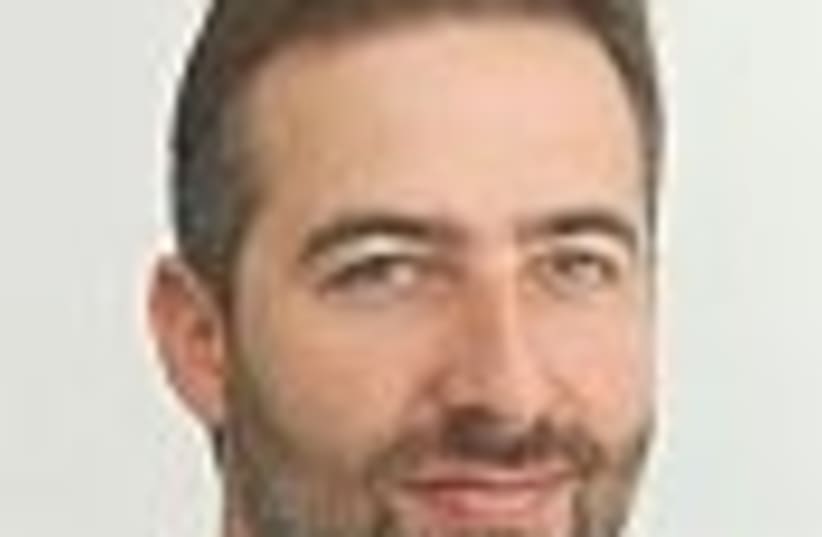President Moshe Katsav was angry, and rightly so. Last June, he convened something called the World Jewish Forum, which collected Jewish leaders and intellectuals from around the world to discuss ways and means to respond to the challenges facing the Jewish people.
Last week, the steering committee met, including university presidents and prominent legislators. But as Katsav himself stated, the June meeting did not tell us anything we didn't know about the crisis, and last week's meeting also did not go far beyond general discussion. Katsav wants to actually do something about the problem, rather than continue to talk about it.
The problem is, as Katsav put it, that there are only about 4.5 million Jews in the world today under the age of 25, and that among them there is an "accelerating loosening of ties and identity with Judaism as a religion, with the Jewish people as a national identity, and with State of Israel as the state of the Jewish people."
At last week's meeting, Rabbi Irving "Yitz" Greenberg concisely summarized the situation in operational terms. Our community, he said, has two types of institutions, those that build Jewish identity and those that largely depend upon the remnants of an inherited identity. The former are grouped in five clusters: Jewish day schools and supplementary education, summer camps, youth groups, Israel travel, and adult education. The latter is most of the Jewish establishment, including federations, defense organizations, etc.
Though Greenberg, who heads the Steinhardt Foundation's Jewish Life Network, did not say so explicitly, he was clearly understood: Our problem is an establishment that feeds off residual Jewish identity but has not systematically reprioritized, let alone embarked on a crash program to bolster the five known identity-builders.
Barry Shrage, Boston's controversial federation head who is the exception that proves the rule, was also at Katzav's meeting. He is one of the few who has steered substantial funding to Jewish education of all types in Boston, where Jewish day schools and adult education are indeed booming and even being used as models for other communities.
Interestingly enough, it was Shrage who made one of the few upbeat observations: that the assimilatory trends we are seeing today really peaked in the 1960s, and that since the Six Day War and, of all things, the Black Power movement, American Jews have become prouder and more comfortable in asserting their own identity in a land that values diversity.
He also noted that the vast majority of inmarried Jewish families do affiliate with a synagogue sometime in their lives - usually around a child's bar or bat mitzva - and that secular Jews are looking for spirituality and community, even if the community is often not geared up to fulfill those needs.
KATSAV SEEMED determined that the next meeting of his Forum, scheduled for Succot, will produce something. Three subcommittees have been tasked to submit operational proposals in three months. One idea was mentioned at the meeting - a financing system that would allow parents to take out long-term low-interest loans to fund their childrens' Jewish education. Such a system could bring the cost of day schools - which some argue have become a potent form of Jewish "birth control" - down to less than $100 per month per child.
This is a brilliant idea which clearly would have some impact, though it is well known that cost is often not the reason that non-Orthodox parents avoid Jewish day schools.
Another important idea raised was to create a Jewish television channel that would not only supply news and information on Israel and Jewry, but would become a conduit for new films and other forms of Jewish art and culture.
Bambi Sheleg, editor of the Israeli magazine Eretz Acheret, argued that we really need films that will dramatize the current Jewish predicament. Our crisis is "interesting, attractive and powerful," she said. The crisis of this tiny people, which has survived so long and has so powerfully shaped the world in which it is now both flourishing and floundering, is indeed a drama begging to be written and produced.
This kind of cultural deficit points to the toughest nut to crack - not the delivery system, those five identity-builders - but their content. There is, after all, no shortage of Jewish involvement in culture, finance and politics. There is no shortage of Jewish creativity and talent. What exists is a shortage of the application of all these abilities to reconstruct a Jewish identity that can compete among our multiple allegiances, or lack thereof, in the modern age.
We are content providers to the world, but what about for ourselves?
Money and power, even if they were more consciously brought to bear, cannot directly answer the question that those on their way out implicitly ask: Why be Jewish? My answer is that identity is more important than ever in our globalized, atomized modern world. And that Jewish identity is much richer than a general liberal impulse to do good. In fact, we should emphasize that Judaism is the source of that impulse, not only for ourselves but indirectly for much of the world.
Young Jews must learn that the spirituality, community, connectedness and meaning that they seek actually exists, as Dorothy discovered in The Wizard of Oz, at home - springing from their own tradition, people and variegated culture. They may have to run away first to figure that out, but they need more help than they are getting to have places to come back to. The renaissance is happening, but it will be difficult for it to take off while the Jewish establishment remains mired in denial, unwarranted despair, and outdated priorities.
saul@jpost.com
- Editorial Page Editor Saul Singer is author of the book, Confronting Jihad: Israel's Struggle & the World After 9/11

